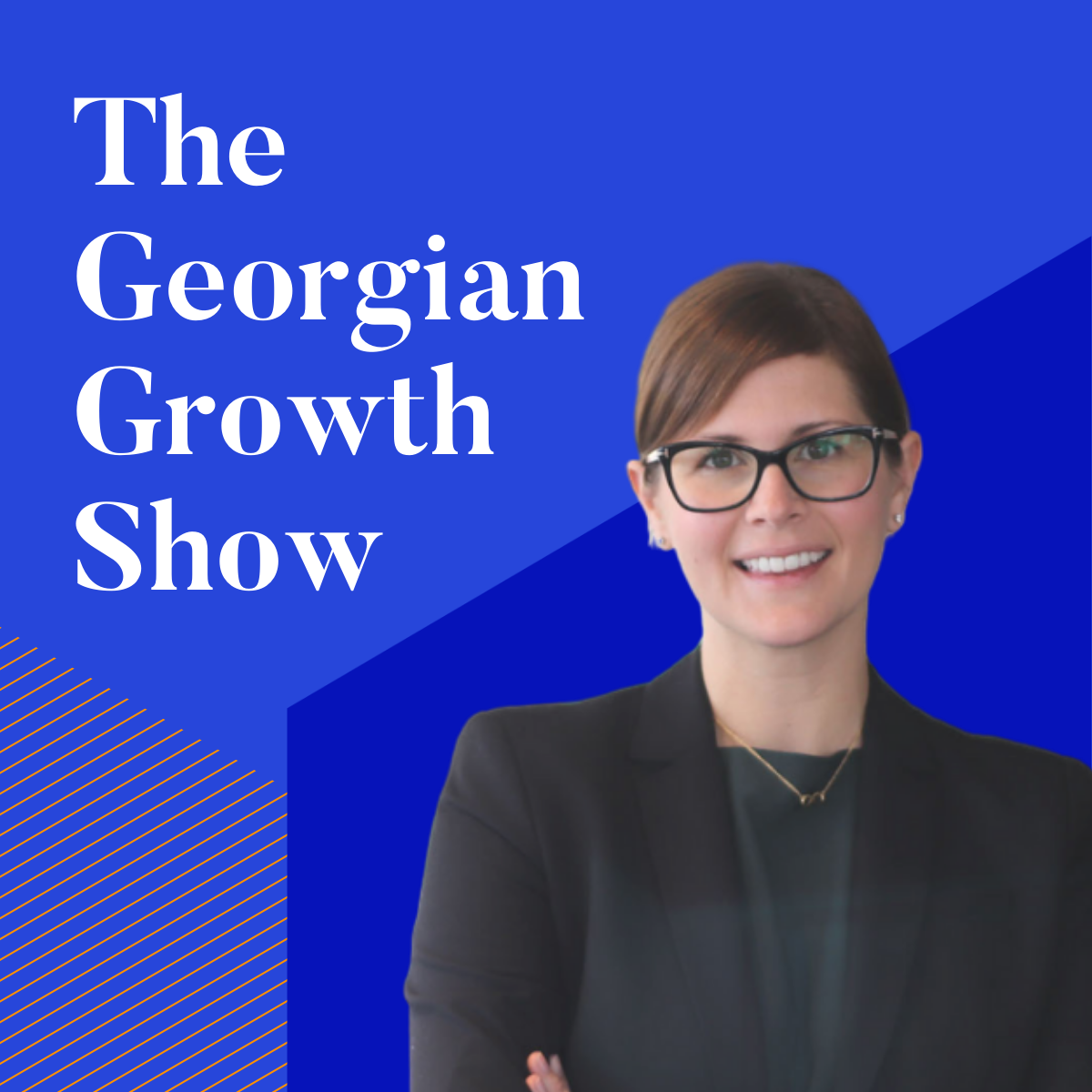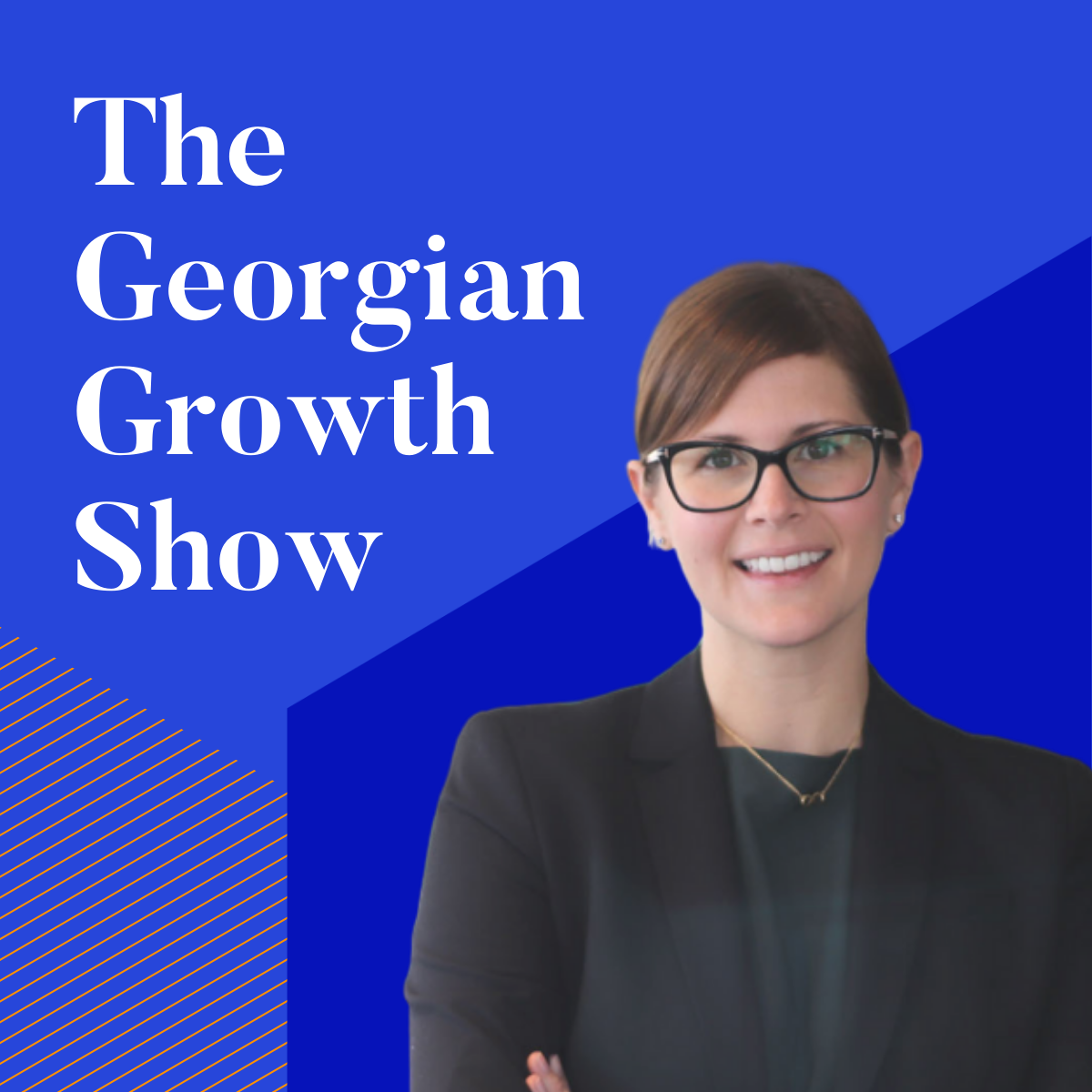How to Write Effective OKRs with Georgian's Debbie Landers
- 0.5
- 1
- 1.25
- 1.5
- 1.75
- 2
Jessica Galang: Hi everyone, and welcome to the Georgian Growth Show. I'm your host, Jessica Galang. You probably already use OKRs to keep your team aligned, but there are so many ways to unlock the full potential of OKRs so you can unlock the full potential of your team. We're here to tell you how. Today we're chatting with Debbie Landers, Head of Operational Success at Georgian. Debbie's OKR certified and has worked with startups and scales around the world. She's here to give us a brief on how to create effective OKRs, some pitfalls to avoid, and how she's seen successful companies use OKRs. So welcome Debbie, and thank you for joining us.
Debbie Landers: Great, thanks, Jessica, it's a pleasure to be here.
Jessica Galang: So can you tell from your perspective what our OKRs is, because I think everyone has their own idea of what objectives and key results mean, but what does it mean to you?
Debbie Landers: In my mind, OKRs are a wonderful tool or a process that can be used to drive alignment across an organization and really enable you to think about what you want to achieve in a given period of time and how you're going to know that you're on track to achieving it. It helps to give everybody in the organization a line of sight to your vision and mission and how they can possibly impact it, and goes beyond just the basic KPIs that are needed to run the business and to bring into play those things that are more innovative and strategic in orientation. They actually grew out of managing by objectives in Silicon Valley because of the need to bring innovation and strategic thinking in alignment with execution and tactical things that have to be achieved on a day to day basis.
Jessica Galang: Okay, and why can OKRs help teams or companies be more successful?
Debbie Landers: I want to be clear on a couple of things, Jessica. While I love OKRs and I am OKR certified, I want to be clear that it is a tool or a process, and what is really important in any tool or process is that you pick the one that works for you and your organization, and you have it, and you commit to it. So OKRs are not a silver bullet, having them in and of themselves is not going to be what makes you successful, but what makes you successful is the fact that you use this tool, which we'll talk about a bit more in detail on how to do that here, to help have those meaningful conversations about what it is you believe you want to achieve or be on the pathway to achieving and how you're going to know that you're doing that. And this mechanism or tools that you use drives those kind of high value conversations around alignment and collaboration that you need to have everybody have that line of sight to what you're trying to achieve, how you're going to get there, and how that ties to your vision and mission. They are a value because they bring in play also the mechanisms to understand how you're doing and what you might need to tweak along the way in order to really bring the outcomes that you want to have for your company.
Jessica Galang: So from your perspective, what do OKRs enable, because to me, it sounds like a way to enable teams to carry out the company vision, but in the day to day?
Debbie Landers: You're absolutely correct, OKRs should not be used as the vehicle for managing the small things, managing your to- do list. What they are intended to do is bring together the organization at different levels around the things that matter most. So what are the three to five things that you want to achieve or be able to demonstrate you're on a pathway to achieving in the period of time in which you're setting them, and how are you going to know that you are driving those outcomes? What are those things that you can measure that will tell you you're on the right track, or that you might need to pivot, or you might need to do something differently, or you might need to help each other out on a particular initiative to make sure that you're achieving that overall goal? So the fact that they are intended to bring one together, an important part of OKRs is that they're visible and shared and that you have these conversations, these regular check- ins, where it is not only important, but it is valued that you bring your challenges to those check- ins so that others can rally around and help you. Because they are intended to be those three to five things that are the most important to the organization or to the team and the team's support of the organization at any point in time in the period in which you're setting them.
Jessica Galang: Okay, and I think that's a good transition to my next question. So how do you create relevant and effective OKRs for your team?
Debbie Landers: So first up, I want to say it's really important that you implement and use OKRs in a way that works for your organization. There are lots of books out there, and YouTube videos, and things that tell you how you should do it, but the really important thing is that you do it in a way that your organization feels good about, that fits with your culture and that you want to continue. It's more important that you commit to the process and using it, and going through that evolution and that you do it perfectly or that you are aligned with the specifics that the experts give you. This kind of stuff doesn't work perfectly the first time so you've got to kind of go through that evolution. So how do you create relevant and effective OKRs that enable you to do all these things for your business? It's important that you find that balancing point between tactical and execution and strategic and innovative objectives. For organizations that I've seen been most effective with this, they've brought together those objectives, so things that need to get done and things that are aligned with that broader vision are important to bring together. OKRs are not intended to be everything that a business must do, not even all the KPIs of what's needed in that quarter or that year to keep your business on track and accelerating need to be part of your OKRs. OKRs should in fact encompass three to five most important things you need to be to achieve or be on track to achieve in that period in which you're setting them. This can help the whole team to understand priorities and have a line of sight to the overall success and support of the mission and vision. OKRs are intended to be set iteratively and collaboratively versus being set top down and cascaded, which means that every level of the company, every team influences the what and the how of what the company does and how they go about supporting it. And they need to be an integral part of what you do, not something that you just set and forget, not your New Year's resolutions. They need to be a tool that is used to drive the conversations that create alignment and facilitate collaboration, and that give a realistic view of status and help needed so that we can get everyone involved in the achievement of the objectives.
Jessica Galang: Okay. And what is the difference between creating effective objectives and key results, if you want to break that down briefly on the difference between the two and making them effective.
Debbie Landers: Right, absolutely. The recommendation which I agree with is that every part of the organization for whom you're doing OKRs, and I'll come back in a moment to my recommendation around who that should be, should have three to five objectives. And these are, again, things you want to achieve, and so they will often start with a noun, so it might be something like improved customer success. And they can be parts of a bigger planner strategy or something that you want to have completed in that particular period, but an effective objective is intended to be inspirational and aspirational in nature, they are intended to align with the mission and vision, to set out that bigger picture, and again, be things that you want to achieve like improved customer satisfaction. Key results are the ways that you will measure your achievement on the path to that objective. So again, the recommendation is that for every objective you set, you have three to five key results that are those indicators that you are on the path to achieving it or have achieved it. They always contain a metric, sometimes that metric could be a binary yes or no, but for the most part they are something measurable that can be achieved. So it's important as you set them that not only what you want to achieve, but you know how you will go about doing that measurement. So if we stick with that improved customer success objective that I mentioned earlier, your key results might be something like an NPS score of greater than 90, or we get five new reference customers. So again, really meaningful things that you can measure that say," Yes, we're on a path to having improved customer success." Key results are not the to- do list, not the set of initiatives that you're going to drive in order to improve customer success. They are the ways that you will measure the impact of those initiatives that you've taken on that objective that you are trying to achieve, and that is probably the hardest thing around writing OKRs that anybody has to deal with, is that it is not the list of things you're going to do, it is the measurement of the effectiveness and the impact of those things that you do on that objective and knowing that you're on the track or that you might need to do something differently in order to be able to get there.
Jessica Galang: Yeah, so just to clarify, when you say measurement, you mean the metrics that you would define as success for those areas?
Debbie Landers: Exactly. So the question you should ask yourself on an objective is, so how do you know? So for example, if you say you want to be the market leader, well, how do you know you're the market leader? You may have to have a certain share, you may need to be recognized in some kind of industry press, that sort of thing. So how do you know that you're achieving that objective? Not that you're going to go out and get a hundred new logos to drive that market share, and so it is the measurement, the metric of the outcome of the initiatives you undertake that show that you are on the path or need to do something differently in the achievement of that objective. And again, the toughest part about writing OKRs is writing those very meaningful metric, measurable data driven outcomes, and not just having it be your to- do list or your list of initiatives you're going to undertake.
Jessica Galang: Yeah, for sure, I can definitely see that being one of the biggest challenge but so worthwhile. So what are some common mistakes with creating OKRs?
Debbie Landers: One of the things I do want to touch on here before I jump into the common mistakes, if I might, Jessica, or maybe this is one of the common mistakes that I often suggest people try to avoid, which is going too far too fast. So when I start with companies on OKRs, I often recommend that they focus on company level and team level. And depending on the size of the organization, that could be one level below the CEO or a couple levels below, but certainly not down to the individual level initially. And the reason for that is it takes a while, as I mentioned earlier, to get this right and to figure out how to do it, and if you're spending all your time trying to get down to very measurable things at the individual level that are tied to these strategic initiatives or these bigger things, the process becomes running you versus you running the process. And to me, the most important thing in OKRs is that this line of sight to how each team is impacting and then each individual seeing how their team impacts those broader set of goals. So I guess that's the first mistake I would avoid, is just trying to roll this out too far too fast. Do more baby steps, get good at it, use it for that alignment, and don't try to drive it too fast or expect it to get it right the first time. After that, when you've actually adopted OKRs and you're figuring it out, the common mistakes that we see, first one obviously is too many objectives and/ or having everyday work be your objective. So again, the thought is how do you find those three to five things that are really things that you want to focus on achieving that really are indicative of the priorities of the company, not just in that short term, but in alignment with the strategy and the mission and vision, and getting down to really being able to say, these are the three to five things that we really want to focus on, so that's important. The second common mistake that we often see is quantitative objectives or qualitative key results. So quantitative objectives, sometimes I'll say, Okay, if you want to set an objective as you are a$ 100 million company by the end of the year, that does have a metric in it, and it is qualitative, but it is also aspirational and inspirational, but you don't want to be saying things like, we'll have five customer complaints this year or something like that. You want to have it be more inspirational than that and not be quantitative, and you certainly don't want qualitative key results. Because you're trying to measure outcome and not effort or activity, you really want to be able to demonstrate that the things you have done are impacting those objectives. Third common mistake we see is cascading versus aligning. Many of us have been in organizations where, here's my boss's goals, good luck, go figure out how you're going to support them. And while there is an element of starting with a company level view and then bringing the teams in, it should be iterative in nature and it should involve the company setting of view, and then the teams looking at that, feeling how they can impact that set of objectives and key results for the company, and then bringing back their thoughts to help shape the company's ones again, and having that process iterate. That's really important, again, because of the conversations that it drives and the integration of each organization's perspective into those overall goals and developing that understanding about how each team is going to impact the groups above them and around them.
Jessica Galang: All right, so this is a really iterative and sometimes challenging process. So I'm curious, as you're going through the process of figuring out if OKRs work for you and how that works for you in your toolkit, how do you get your team on board with OKR culture?
Debbie Landers: So the first thing is really making sure that as you set those company goals, you engage the teams, because what you want is to inspire the entire organization to think about how they and their team, and all of us as a group can contribute to the bigger picture, the hitting of the company's OKRs, that movement towards the strategy and vision, and really inspiring a culture where everyone feels ownership and has a line of sight to how those things are going to happen. And by taking that first draft, if you will, of the company OKRs and sharing with them with the teams and inspiring that conversation about how are we going to help, how are we going to be part of this success? How are we going to take a key result around something like becoming a market leader and really ensuring that we win and take an objective for our own marketing team of engaging in and winning an industry recognition, and how are we going to know that we're being successful in that? Really is a way of getting every team engaged in it. And then it's making sure that tool or process becomes something that you drive and not what drives you, that it really is something that the teams use to inspire those conversations, that it's not about just filling out scorecards or filling in boxes on a certain piece of software, but it really is about those check- ins, that collaboration, that sharing of information. And once you do that, you can really inspire people to open up to share, to collaborate, and to bring forward what they and their teams can contribute to achieving those goals. And you do that by not making OKRs the center of everything, they are an overlay, but you also have your day to day operations and things you need to do. You have individual performance management where contribution to OKRs is a necessary but insufficient measurement of any individual's performance, but it is enabling everybody to feel that they're part of that bigger picture, part of that company, a part of driving that success, and a part of knowing that you're on track to achieving those goals.
Jessica Galang: Okay. And last question for me, are there any trends you've seen with our customers, which we at Georgian, we refer to them as our portfolio companies, that use OKRs as well, and if you have any examples of that?
Debbie Landers: Yeah, I think it's really, Jessica, all the points that I mentioned earlier. It's those companies who don't think about OKRs as," Oh it's December or it's January, we need to set the OKRs for the year and then we're going to push them down into the organization. We're going to tell everybody this is what we're doing and then we'll come back maybe at the end of the quarter, maybe at the end of the half year and just checkpoint on how we're doing, and other than that, we don't think about them." The organizations that are successful with OKRs, again, are those that use it as a tool to inspire the conversation and the collaboration around the things that need to be achieved by the organization. They don't view them as steadfast hard rules that have to be adhered to, they view them as the aspirations, inspirations, and things that we're all trying to achieve and that we're going to collaborate on that know that things change in the business, that are able to use the information from this ongoing discussion and check in to pivot when pivoting is required, and that really engage everybody on an ongoing basis in an open sharing and collaborative environment in the things that need to be achieved. So where I've seen it done well, it's that where I've seen it fail is where somebody told us we have to do OKRs, so here I've got it done, I'm going to set it off to the side and hope like heck they don't come and ask me about them because I'm not really actually measuring them. That sort of thing is where I've seen there be challenges.
Jessica Galang: Well, Debbie, thank you so much for this really helpful walkthrough on OKRs, I think it's illuminating for our lot of our listeners and we appreciate you taking the time.
Debbie Landers: Well, thank you for having me, Jessica, and I'd love to engage more closely with any and all of our companies on how they go about doing OKRs.
DESCRIPTION
It’s been said that dreams stay dreams until we wake up to execute. For effective execution, OKRs — Objectives and Key Results — simplify complex missions or goals into manageable, achievable and measurable milestones.
On this episode of the Georgian Growth Show, we talk to Debbie Landers, Head of Operational Success at Georgian and certified OKR professional. While OKRs are not silver bullets single-handedly responsible for organizational success, Debbie says, they drive high-value conversations around mission alignment and collaborations within an organization.
“OKRs are intended to bring together different levels of the organization around what matters most,” Debbie says.
In this latest podcast episode, you’ll hear about:
- OKRs: What they are and what they are not.
- Creating relevant and effective OKRs for your organization.
- Differentiating between effective objectives and key results.
- Common mistakes made while writing OKRs.
- Getting your team on board with the OKR culture.
- Why OKR results differ across organizations.
Today's Host

Jon Prial







